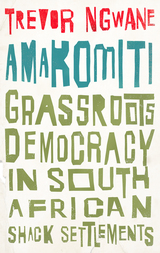
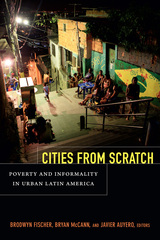
Contributors. Javier Auyero, Mariana Cavalcanti, Ratão Diniz, Emilio Duhau, Sujatha Fernandes, Brodwyn Fischer, Bryan McCann, Edward Murphy, Dennis Rodgers
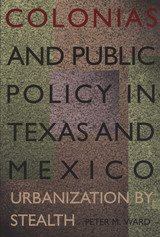
Today in Texas, over 1500 colonias in the counties along the Mexican border are home to some 400,000 people. Often lacking basic services, such as electricity, water and sewerage, fire protection, policing, schools, and health care, these "irregular" subdivisions offer the only low-cost housing available to the mostly Hispanic working poor.
This book presents the results of a major study of colonias in three transborder metropolitan areas and uncovers the reasons why colonias are spreading so rapidly. Peter Ward compares Texas colonias with their Mexican counterparts, many of which have developed into fully integrated working-class urban communities. He describes how Mexican governments have worked with colonia residents to make physical improvements and upgrade services-a model that Texas policymakers can learn from, Ward asserts. Finally, he concludes with a hard-hitting checklist of public policy initiatives that need to be considered as colonia housing policy enters its second decade in Texas.
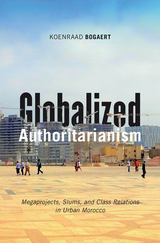
A rich investigation into Morocco’s urban politics
Over the past thirty years, Morocco’s cities have transformed dramatically. To take just one example, Casablanca’s medina is now obscured behind skyscrapers that are funded by global capital and encouraged by Morocco’s monarchy, which hopes to transform this city into a regional leader of finance and commerce. Such changes have occurred throughout Morocco. Megaprojects are redesigning the cityscapes of Rabat, Tangiers, and Casablanca, turning the nation’s urban centers into laboratories of capital accumulation, political dominance, and social control.
In Globalized Authoritarianism, Koenraad Bogaert links more abstract questions of government, globalization, and neoliberalism with concrete changes in the city. Bogaert goes deep beneath the surface of Morocco’s urban prosperity to reveal how neoliberal government and the increased connectivity engendered by global capitalism transformed Morocco’s leading urban spaces, opening up new sites for capital accumulation, creating enormous class divisions, and enabling new innovations in state authoritarianism. Analyzing these transformations, he argues that economic globalization does not necessarily lead to increased democratization but to authoritarianism with a different face, to a form of authoritarian government that becomes more and more a globalized affair.
Showing how Morocco’s experiences have helped produce new forms of globalization, Bogaert offers a bridge between in-depth issues of Middle Eastern studies and broader questions of power, class, and capital as they continue to evolve in the twenty-first century.
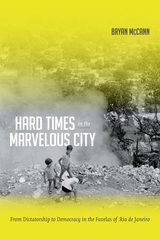


For all of Brazil's efforts to reduce poverty-and its progress-the favelas in Rio de Janeiro still house one-third of the city's poor, and violence permeates every aspect of the city. As urban drug gangs and police wage war in the streets, favela residents who are especially vulnerable live in fear of being caught in the crossfire. Politicians, human rights activists, and security authorities have been working to minimize the social and economic problems at the root of this "war."
Living in the Crossfire presents impassioned testimony from officials, residents, and others in response to the ongoing crisis. Maria Helena Moreira Alves and Philip Evanson provide vivid accounts from grieving mothers and members of the police working to stop the war and, among officials, from Brazil's President Luis Inácio Lula da Silva, who discusses his efforts to improve public security.
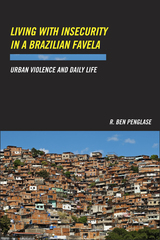
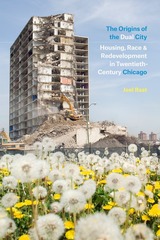
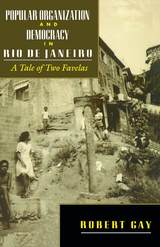
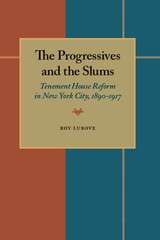
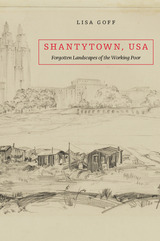
The word “shantytown” conjures images of crowded slums in developing nations. Though their history is largely forgotten, shantytowns were a prominent feature of one developing nation in particular: the United States. Lisa Goff restores shantytowns to the central place they once occupied in America’s urban landscape, showing how the basic but resourcefully constructed dwellings of America’s working poor were not merely the byproducts of economic hardship but potent assertions of self-reliance.
In the nineteenth century, poor workers built shantytowns across America’s frontiers and its booming industrial cities. Settlements covered large swaths of urban property, including a twenty-block stretch of Manhattan, much of Brooklyn’s waterfront, and present-day Dupont Circle in Washington, D.C. Names like Tinkersville and Hayti evoked the occupations and ethnicities of shantytown residents, who were most often European immigrants and African Americans. These inhabitants defended their civil rights and went to court to protect their property and resist eviction, claiming the benefits of middle-class citizenship without its bourgeois trappings.
Over time, middle-class contempt for shantytowns increased. When veterans erected an encampment near the U.S. Capitol in the 1930s President Hoover ordered the army to destroy it, thus inspiring the Depression-era slang “Hoovervilles.” Twentieth-century reforms in urban zoning and public housing, introduced as progressive efforts to provide better dwellings, curtailed the growth of shantytowns. Yet their legacy is still felt in sites of political activism, from shanties on college campuses protesting South African apartheid to the tent cities of Occupy Wall Street demonstrations.
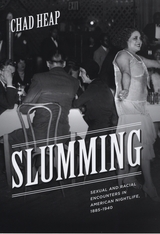
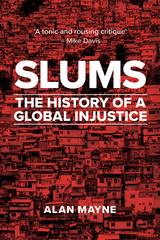
In this comprehensive global history, Alan Mayne explores the evolution and meaning of the word “slum,” from its origins in London in the early nineteenth century to its use as a slur against the favela communities in the lead-up to the Rio Olympics in 2016. Mayne shows how the word slum has been extensively used for two hundred years to condemn and disparage poor communities, with the result that these agendas are now indivisible from the word’s essence. He probes beyond the stereotypes of deviance, social disorganization, inertia, and degraded environments to explore the spatial coherence, collective sense of community, and effective social organization of poor and marginalized neighborhoods over the last two centuries.
In mounting a case for the word’s elimination from the language of progressive urban social reform, Slums is a must-read book for all those interested in social history and the importance of the world’s vibrant and vital neighborhoods.
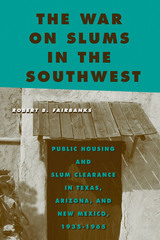
In The War on Slums in the Southwest, Robert Fairbanks provides compelling and probing case studies of economic problems and public housing plights in Albuquerque, Dallas, Houston, Phoenix and San Antonio. He provides brief histories of each city--all of which expanded dynamically between 1935 and 1965--and how they responded to slums under the Housing Acts of 1937, 1949, and 1954.
Despite being a region where conservative politics has ruled, these Southwestern cities often handled population growth, urban planning, and economic development in ways that closely followed the national account of efforts to eliminate slums and provide public housing for the needy. The War on Slums in the Southwest therefore corrects some misconceptions about the role of slum clearance and public housing in this region as Fairbanks integrates urban policy into the larger understanding of federal and state-based housing policies.
READERS
Browse our collection.
PUBLISHERS
See BiblioVault's publisher services.
STUDENT SERVICES
Files for college accessibility offices.
UChicago Accessibility Resources
home | accessibility | search | about | contact us
BiblioVault ® 2001 - 2024
The University of Chicago Press









